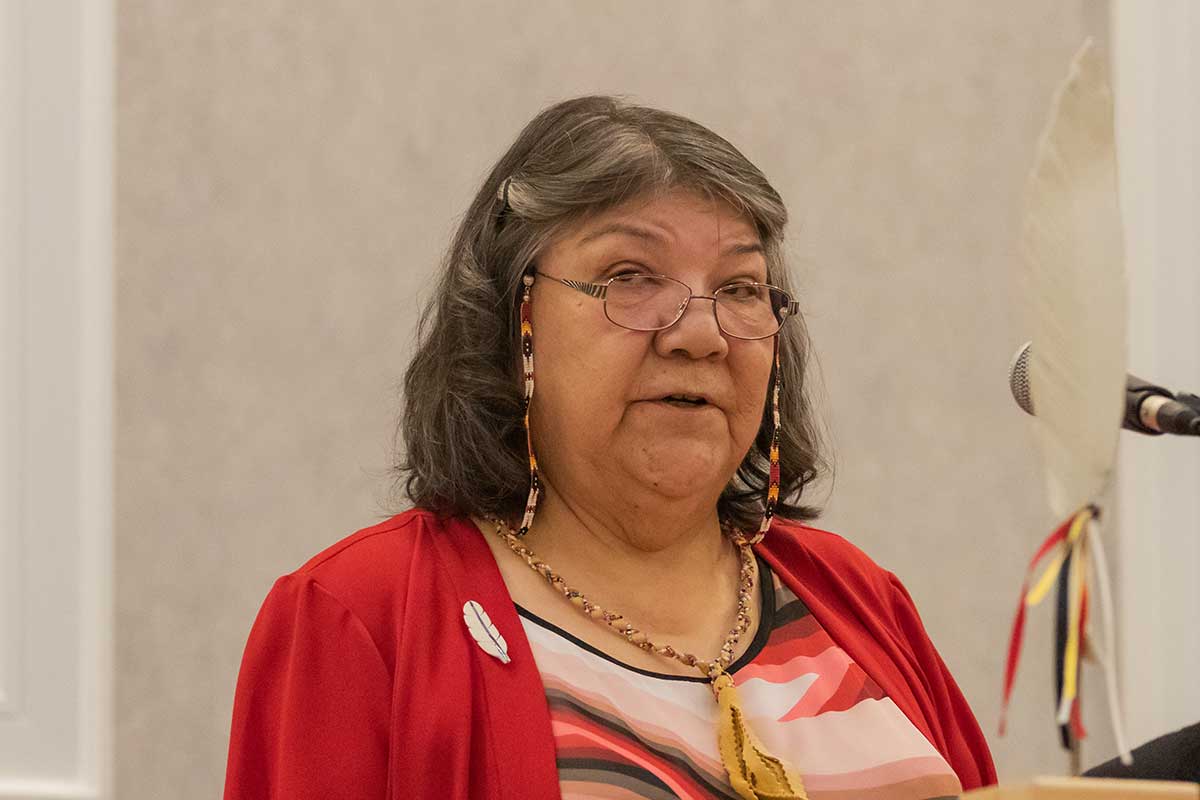On June 21, National Indigenous People’s Day, Bishop Shane Parker announced that he had appointed Margaret Pachanos Lemaire as Anglican Indigenous Advisor to the Bishop of Ottawa.
Lemaire is a member of Christ Church Bells Corners, where she has served in a number of leadership roles. She is also a founding member and co-chair of the diocesan All My Relations Circle, whose mandate is to provide leadership to individuals and parishes concerning Indigenous Peoples and to encourage engagement with the 94 Calls to Action from the Final Report of Canada’s Truth and Reconciliation Commission. As such, Lemaire is a familiar face to many in the diocese, but she graciously agreed to an interview to help Crosstalk readers to get to know a bit more about her.
A member of the Cree First Nation of Chisasibi, Lemaire grew up on the eastern coast of James Bay, where her parents, like most of the community, were out on the land 10 months of the year, hunting, fishing and trapping. “When I first went to school I went to the Indian Residential School of Fort George. (St. Philip’s Indian Residential School),” Lemaire said. Later, the whole community was relocated. “They moved that settlement on the mainland when the big James Bay hydroelectric project was put in on that river.”
She went to an Indian Residential School in La Tuque, north of Shawinigan, for a year. “La Tuque was the hardest in terms of being lonely. Oh my gosh, I thought I’d die of loneliness when we left because that was the first time I’d ever left my community. I think that’s why they put us in the far away place. There were a lot of kids that tried to run away and go home. And some of them did not make it.”
Lemaire said the schools had very harsh rules. “I remember at least twice where I got the strap.” It was a shock coming from a culture that did not discipline children like that, she recalls. “But the worst part, looking back, is you are put into this environment where you do not have your family with you and when you needed consoling, there was nobody to hug or kiss you.”
When school was finished and the ice was gone from the rivers, people would return back to community, and the children could return to their families for the summer. Lemaire said the Cree language in that area is very strong. Her parents did not speak English and she continued to speak Cree.
In the 1960s, the churches began to give up operation of the schools and the government took over and began closing some of the schools. Lemaire was among children who were sent to the community of Rouyn-Noranda to continue their schooling. ”They placed us in foster homes,” she said.
Despite the emotional cost of being separated from her family and community, Lemaire said she wanted to go to school. “Unlike some of my friends, I used to feel so bad, when they said I’m quitting school. I just wanted to continue going to school.”
After graduating, Lemaire began post-secondary studies in business administration in Montreal, where she met her husband. He was pursuing his Master’s degree in education at the University of New Brunswick in Fredericton, so Lemaire continued her education and began her career and family in Fredericton, working with Indigenous organizations, including the Non-status and Metis Association (now called Council of Aboriginal People) and the Union of New Brunswick Indians, (the First Nations of New Brunswick.)
While working with the Non-status and Metis Association, she travelled to Winnipeg as a representative from New Brunswick to help Sandra Lovelace prepare to go before the United Nations to argue that The Indian Act discriminated against Indigenous women who lost their Indigenous status if they married non-Indigenous men. “It was interesting. And I kept a close eye on her and what the outcome was, and as we know Bill C-35 came about when the Indigenous women got their status back,” said Lemaire.
Later in her career, she worked for the federal departments of Indian and Northern Affairs and for Human Resources and Development Canada.
Reflecting on the issue of Indian Residential Schools, Lemaire says people have asked her “Why didn’t you says something? And I say “We did.” The communities are so devout Anglicans. You didn’t dare question authority. So when some student would tell parents this is happening and they would sort of say ‘Sh, sh, sh.’ So nothing came about until the students themselves started to speak up as they got older and that’s when it all started.”
Regarding the unmarked graves found at the sites of the former schools, Lemaire said “We knew something was happening. … Because in the communities, when we went home in June, some kids didn’t come home. I know of at least two cases. My brother-in-law’s sister had died in the residential school, and the parents were never told until we went home in June. The father turned to his other kids and asked where’s your sister? …. And the other one was a father who went down to meet the plane as the kids were coming home, and he said, ‘Where’s … my daughter?’ And that’s when they told him. He just fainted in shock. A lot of them, that’s how they were told.”
Lemaire said that even if parents were out on the land, they could have received news about the deaths of their children in better ways.
“There was the mail… All communities had a church…Every time, I cry when I hear. And I say, finally. Finally those little ones are speaking and people are listening now.”
“There’s so much to be told,” she said, adding that Bishop Shane has encouraged her about the need for truth-telling. “That’s where I was coming from with the All My Relations, the education part. I said, “It is coming. Some people are way ahead, like the school boards. They have incorporated learning about the culture. … Some people are really interested. It’s amazing the spectrum of people we’ve met ever since we started All My Relations.”




“Grow old along with me! The best is yet to be.”